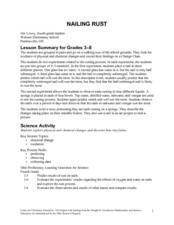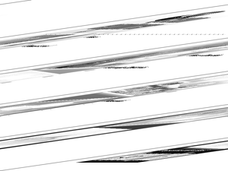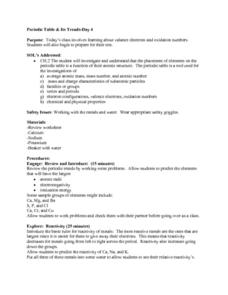Curated OER
Periodic Behavior of Oxides
Students investigate the properties of oxides and observe their periodic trends. In this behavior of oxides lesson plan, students experiment with metallic oxides and non-metallic oxides to determine if they are acid, basic or amphoteric...
Cornell University
Splitting Water with Electricity
Explore how electricity splits water molecules into hydrogen and oxygen. Learners begin by calculating the voltage necessary to separate the water. They then perform the experiment and measure the ratio of hydrogen and oxygen bubbles.
Curated OER
Oxidation-Reduction Reactions
Focus on oxidation-reduction reactions with a review worksheet. Junior chemists answer short-answer questions before they write balanced half-reaction and full-reaction equations.
LABScI
Electrolysis: Splitting Water
Explore the chemical components of water through an electrolysis reaction. Scholars use a battery to divide various water solutions into different gases. As they collect the gases, they measure the volume and make a comparison to the...
Curated OER
Find the Percent of Iron in Manganate (VII)
Dilute sulphuric acid is used to oxidize manganate (VII) into manganese (II) and water. Step-by-step procedures are outlined on the worksheet as well as calculations for junior chemists to perform in their science journals. This...
Curated OER
Oxidation: How Can It Be Proved?
Young scholars explore the process of oxidation. In this lesson about oxidation, students observe four different demonstrations. Young scholars watch examples of oxidation in order to understand the process. Students discuss the chemical...
Curated OER
Rusting-A Form of Oxidation
Students conduct an experiment to observe oxidation. In this chemistry lesson, students explain how rusting happens. They rank metals according to their conductivity.
Curated OER
Oxidation and Salt
Learners study the reaction on iron in water, air, and sodium chloride. They create a situation that shows this process and gives them the opportunity to hypothesize what, why, and how. They keep records and do an oral and written ...
Curated OER
Factors Which Affect Corrosion
Young scholars investigate the factors which affect corrosion. In this corrosion lesson plan, students experiment with 2 nails, copper wire and magnesium ribbon placed in a petri dish of agar solution, potassium ferricyanate and an...
Curated OER
Nailing Rust
When your upper elementary or middle school class is learning about chemical changes, these activities help demonstrate the concepts. In Part A, they submerge and place a nail partially underwater, then after a week they make...
Curated OER
A Test-Tube Study of Redox Reactions
Six different redox reactions are set up in the lab by your chemistry class. Inquisitors methodically test each one and eventually order them according to oxidizing strength. This is a neat way to have the learners perform more than one...
Curated OER
Kinetics Reactions: The Effect of a Catalyst
Students investigate the effects of a catalyst on an oxidation reaction. For this catalyst lesson plan, students use a catalyst, cobalt chloride for the oxidation reaction of potassium sodium tartrate with hydrogen peroxide. Students...
Royal Society of Chemistry
A Reversible Reaction of Hydrated Copper (II) Sulfate
How can removing water change the color of a substance? Lab partners remove the water of crystallization from hydrated copper (II) sulfate, record their observations, then rehydrate the solid. The resource is printable and contains ideas...
Curated OER
Chemical Consequences of Burning Fossil Fuels
Future scientists are introduced to the chemical consequences of burning fossil fuels, learning that fossil fuel combustion leads to the formation of oxides of three nonmetals: carbon, nitrogen, and sulfur, all of which end up in the...
Curated OER
Water Purification
Learners develop an understanding and appreciation of water purification techniques and their implications for health maintenance.
Curated OER
Staying Young with Vitamin E
Investigate how Vitamin E is used to prevent cell aging. Young scientists coat the surface of apples and bananas with oil, Vitamin E, and water. They place each in a petri dish and cover them to observe oxidation over time. They answer 8...
Curated OER
H2O2 Decomposition Lab II
Students conduct an oxidation experiment in which they must determine how much hydrogen peroxide (H2O2) is actually in a store-bought solution of H2O2.
Curated OER
Naming Acids
In this naming acids worksheet, students are given a chart with polyatomic ions and acid names with oxidation states, prefixes and suffixes. They use the chart to help name the eighteen given acids.
Curated OER
Reduced Fare
Students discover the relationship between tectonic plate boundaries and the communities of life that thrive at such boundaries. In this biology lesson, students find that methane from oxidized carbon in sediments provides nutrients for...
Curated OER
Bonding
In this bonding activity, students read about the octet rule in bonding, ion notation, ionic bonds, covalent bonds and oxidation numbers. Students write 2 ion notations, they determine if 8 sets of ions will make compounds, they draw 2...
Curated OER
Periodic Table And Its Trends - Day 4
Guide your chemistry class through the periodic table so that they are able to identify atomic radii, electronegativity, and ionization energy. Give them three metals to place in water to observe reactivity. Teach them to write electron...
Curated OER
Life Means Water Environment
Learners investigate pH levels in bodies of water and experiment with acid/base reactions. In this water and pH lesson, students observe changes in pH levels of a sample solution and observe a Bronsted-Lowry reaction. Learners...
Curated OER
Water Resource Engineering
Young scholars examine solubility and the significance of water. In this aqueous solution lesson plan students complete a lab activity on soil profiles.
Curated OER
Rusting-A Form of Oxidation
Students observe the rusting process in the lab. In this chemistry lesson, students rank metals according to their conductivity. They give real world applications of this activity.

























